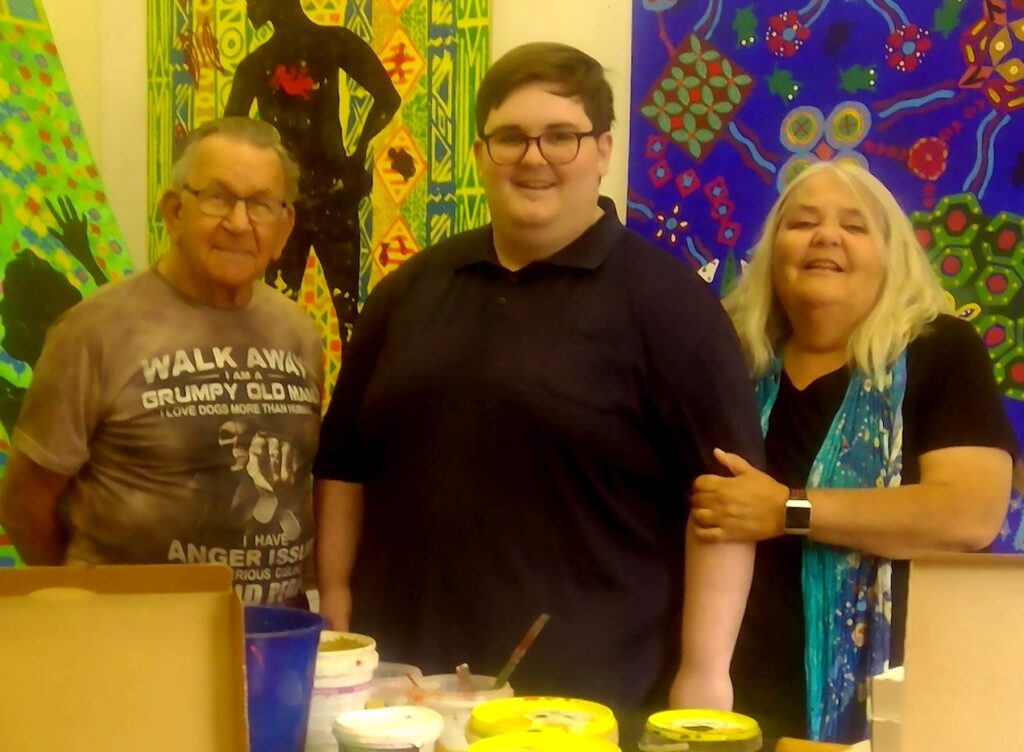Pitcha Makin Fellas – Connections Beyond

By Tabitha Glanville, Arts Law Artists in the Black Outreach Officer 2025 – VIC
In September this year I made a trip to visit the Pitcha Makin Fellas (PMF), a collective of south-eastern Aboriginal creative practitioners, in their Ballarat-based studio. Having already made a solid connection with PMF earlier in the year, the purpose of this visit was to reintroduce the new role of Victorian Outreach under Arts Law’s Artists in the Black (AITB) program.
In 2015 the Pitcha Makin Fellas utilised Arts Law’s pro bono service through AITB in a case against an incredibly high-profile Australian sporting organisation. The organisation had commissioned PMF to create a work which would appear nationwide in media releases, including a two-hour prime-time television slot. The organisation expected to use and receive these commissioned works without financial compensation to PMF, and further refused to credit the Aboriginal creative collective in any media release or platforming.

I believe that non-Aboriginal inhabitants of this country sit on an unpayable debt owed to our traditional owners, our first people. As is the nature of debt, the people who are keenly and consistently aware of the owing are those awaiting it. Those who owe often need reminding, and the ‘reminding’ is typically a nasty business, particularly when the debt should never have existed. Indigenous belief systems are founded upon moiety, or duality. Reciprocal relationships with the land, plants, animals, and people have guided our cultural labour for more than 65,000 years. Tyson Yunkaporta states via Sand Talks:
In our world nothing can be known or even exist unless it is in relation to other things. Most importantly, those things that are connected are less important than the forces of connection between them. We exist to form these relationships, which make up the energy that holds creation together.
When these belief systems are disrupted or disrespected, the connection is soured and spoiled. When the aforementioned sporting organisation failed to establish and acknowledge a respectful and reciprocal relationship with PMF, a trauma response was triggered within the members.
The Pitcha Makin Fellas spoke in length about the lasting effect these negative interactions have on them as creative and cultural practitioners. Through a pro bono lawyer at Allens, Arts Law was able to work with PMF and successfully arranged remuneration. However, cases such as these are traumatic events for mob. PMF’s main concerns moving forward revolve around trust, and guaranteed respect. Whilst this speaks more to moral fibre than anything to do with legality, conversations around ICIP legislations and cultural property inspire hope. Most artists are unaware that their creative labour can and should be delivered with a contract and list of terms for future use; beginning these conversations before any agreement is made is a necessity. De-westernised forms of education surrounding Indigenous rights and property incite conversations and alter the dialogue surrounding repatriation.
As the south-eastern outreach for the Artists in the Black program, my conversations with PMF scaffold my future objectives in this role. The lasting effects these cases have on Aboriginal artists are concerning and looming, which is why outreach officer roles like mine, and the role of the AITB Coordinator, Jo-Anne Driessens, are incredibly important, alongside AITB paralegal Cassia Bray. Our positions are designed to breach the uncomfortable, often traumatic gap between our community and the justice system. Continued connection post legal advice is imperative – as mentioned before, the connection is more important than those connected. To sustain the work we do under Artists in The Black, we must continue community support and involvement.




